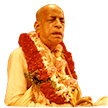Vedic Principles - an essential subject: Difference between revisions
(Created page with "Category:Essential Subjects <!----------------------- edit below this line -----------------------> <!------------------------ begin introduction text below --------------...") |
(Vanibot #0041: Moves Choose Another box to the end) |
||
| Line 2: | Line 2: | ||
<!----------------------- edit below this line -----------------------> | <!----------------------- edit below this line -----------------------> | ||
<!------------------------ begin introduction text below ------------------------> | <!------------------------ begin introduction text below ------------------------> | ||
The whole Vedic principle is to develop Krishna Consciousness, without creating much botheration for the program of sense gratification. Industrial development (or mining industry) in the neighboring places will mar the whole idea. | |||
According to our Vedic principles one who has full faith in the Vedic knowledge, he's āstika. And who has no faith in the Vedic knowledge, he's nāstika. So be āstika, don't be nāstika. There is no useful purpose becoming a nāstika. Be āstika. And the essence of Vedic knowledge is Bhagavad-gītā because the Supreme Personality of Godhead is speaking personally. Take advantage of it. Apply it practically life and be happy not only in this life, but the next life. | |||
Srila Prabhupada's books, lectures, conversations and letters offer a comprehensive presentation of this essential subject as seen in the Vaniquotes '''[[Vaniquotes:Category:Vedic Principles|Vedic Principles]]''' category. An introduction from his books is given below in the following | Srila Prabhupada's books, lectures, conversations and letters offer a comprehensive presentation of this essential subject as seen in the Vaniquotes '''[[Vaniquotes:Category:Vedic Principles|Vedic Principles]]''' category. An introduction from his books is given below in the following 10 quotes. | ||
<!-------- end introduction text and don't touch next three lines ---------> | <!-------- end introduction text and don't touch next three lines ---------> | ||
== Quotes from Srila Prabhupada's books == | == Quotes from Srila Prabhupada's books == | ||
<!----------------- edit quote boxes below this line -----------------> | <!----------------- edit quote boxes below this line -----------------> | ||
{{VaniQuotebox| | {{VaniQuotebox|A married woman should not search for a paramour, for this is not sanctioned by the Vedic principles of life|A married woman should not search for a paramour, for this is not sanctioned by the Vedic principles of life. If you think that you are very much attached to Me and you want My association, I advise you not to personally try to enjoy Me. It is better for you to go home, simply talk about Me and think of Me, and by this process of constantly remembering Me and chanting My names you will surely be elevated to the spiritual platform. '''(Kṛṣṇa Book, Chapter 29)'''}} | ||
{{VaniQuotebox| | {{VaniQuotebox|Although chaste women may follow the rules and regulations of Vedic principles to become ever faithful to their husbands, Krsna is able to break their stonelike chastity with the chisel of His beauty|In other words, although chaste women may follow the rules and regulations of Vedic principles to become ever faithful to their husbands, Kṛṣṇa is able to break their stonelike chastity with the chisel of His beauty. Most of the girl friends of Kṛṣṇa were married, but because Kṛṣṇa was their friend before their marriages, they could not forget His attractive features, which were always fascinating to them, even after their marriages. '''(Nectar of Instruction, Text 22)'''}} | ||
{{VaniQuotebox| | {{VaniQuotebox|Although Mayavadi philosophers pretend to accept the Vedic principles, because they do not accept the Supreme Personality of Godhead they indirectly preach Buddhist philosophy, or atheistic philosophy|Although Māyāvādī philosophers pretend to accept the Vedic principles, because they do not accept the Supreme Personality of Godhead they indirectly preach Buddhist philosophy, or atheistic philosophy. Māyāvādī philosophy is inferior to Buddhist philosophy, which directly denies Vedic authority. '''(Teachings of Lord Caitanya, Chapter 25)'''}} | ||
{{VaniQuotebox| | {{VaniQuotebox|Among human beings, those who are followers of the Vedic principles are considered civilized. Among these, almost half simply give lip service while committing all kinds of sinful activities against these principles|Among human beings, those who are followers of the Vedic principles are considered civilized. Among these, almost half simply give lip service while committing all kinds of sinful activities against these principles. Such people do not care for the regulative principles. '''(Caitanya-caritāmṛta, Madhya-līlā 19.146)'''}} | ||
{{VaniQuotebox| | {{VaniQuotebox|Anyone who does not accept the spiritual form of the Supreme Lord is counted among the atheists. Because Lord Buddha did not accept these Vedic principles, the Vedic teachers consider him an atheist|Anyone who does not accept the spiritual form of the Supreme Lord is counted among the atheists. Because Lord Buddha did not accept these Vedic principles, the Vedic teachers consider him an atheist. Although Māyāvādī philosophers pretend to accept the Vedic principles, because they do not accept the Supreme Personality of Godhead they indirectly preach Buddhist philosophy, or atheistic philosophy. '''(Teachings of Lord Caitanya, Chapter 25)'''}} | ||
{{VaniQuotebox| | {{VaniQuotebox|Animal sacrifice without reference to the Vedic principles|Although there are certain restrictive rules and regulations regarding animal sacrifice for particular purposes in the Vedas, people of demonic tendency still took to animal sacrifice without reference to the Vedic principles. Lord Buddha appeared to stop this nonsense and to establish the Vedic principles of nonviolence. '''(Bhagavad-gītā 4.7)'''}} | ||
{{VaniQuotebox| | {{VaniQuotebox|Anything not supported by the Vedic principles must be considered imaginary and lacking in standard proof. Therefore no impersonalist explanation of any Vedic literature can be accepted|Since the speculation of the impersonalists does not follow the principles of the Vedas, their conclusion must be considered to be against the Vedic principles. Anything not supported by the Vedic principles must be considered imaginary and lacking in standard proof. Therefore no impersonalist explanation of any Vedic literature can be accepted. '''(Caitanya-caritāmṛta, Ādi-līlā 6.14-15)'''}} | ||
{{VaniQuotebox| | {{VaniQuotebox|As an independent leader among elephants enters the water with its female elephants, Krsna, who is transcendental to the Vedic principles of morality, entered the water of the Yamuna with the gopis|As an independent leader among elephants enters the water with its female elephants, Kṛṣṇa, who is transcendental to the Vedic principles of morality, entered the water of the Yamunā with the gopīs. His chest had brushed against their breasts, crushing His flower garland and coloring it with red kuṅkuma powder. '''(Caitanya-caritāmṛta, Antya-līlā 18.25)'''}} | ||
{{VaniQuotebox|During these democratic days, monarchy is disliked by the people, but here is an example of how an emperor (Rsabhadeva) of the whole world kept all the citizens fully satisfied by supplying the necessities of life and following the Vedic principles|During these democratic days, monarchy is disliked by the people, but here is an example of how an emperor of the whole world kept all the citizens fully satisfied by supplying the necessities of life and following the Vedic principles. Thus everyone was happy during the reign of Mahārāja Ṛṣabhadeva, the Supreme Personality of Godhead. '''(Śrīmad-Bhāgavatam 5.4.18)'''}} | |||
{{VaniQuotebox|Human society should therefore follow the Vedic principles of life, which are summarized in Bhagavad-gita|Thus one who is deliberately transgressing the rules and regulations of the śāstras is simply involving himself more and more in material existence in the three modes of material nature. Human society should therefore follow the Vedic principles of life, which are summarized in Bhagavad-gītā. '''(Śrīmad-Bhāgavatam 4.26.8)'''}} | |||
<!----------------- edit quote boxes above this line -----------------> | <!----------------- edit quote boxes above this line -----------------> | ||
| Line 30: | Line 35: | ||
'''Vedic Principles- [[Vaniquotes:Category:Vedic Principles|explore more within this category]]'''. | '''Vedic Principles- [[Vaniquotes:Category:Vedic Principles|explore more within this category]]'''. | ||
{{EsentialSubjectTotal}} | {{EsentialSubjectTotal}} | ||
<div style="float:left;"> | |||
{{EssentialSubjectnav}} | |||
</div> | |||
__NOTOC__ | __NOTOC__ | ||
__NOEDITSECTION__ | __NOEDITSECTION__ | ||
Latest revision as of 18:08, 22 November 2020
The whole Vedic principle is to develop Krishna Consciousness, without creating much botheration for the program of sense gratification. Industrial development (or mining industry) in the neighboring places will mar the whole idea. According to our Vedic principles one who has full faith in the Vedic knowledge, he's āstika. And who has no faith in the Vedic knowledge, he's nāstika. So be āstika, don't be nāstika. There is no useful purpose becoming a nāstika. Be āstika. And the essence of Vedic knowledge is Bhagavad-gītā because the Supreme Personality of Godhead is speaking personally. Take advantage of it. Apply it practically life and be happy not only in this life, but the next life.
Srila Prabhupada's books, lectures, conversations and letters offer a comprehensive presentation of this essential subject as seen in the Vaniquotes Vedic Principles category. An introduction from his books is given below in the following 10 quotes.
Quotes from Srila Prabhupada's books
Vedic Principles- explore more within this category.
Vanipedia has now over 903 introductory articles compiled from Srila Prabhupada's books under the series titled Essential Subjects. All these articles can be seen in the Table of Content on the right side of this article and also here in this Umbrella Category. Browse through them to relish the breadth and depth of Srila Prabhupada's teachings - There is a subject for everyone.









